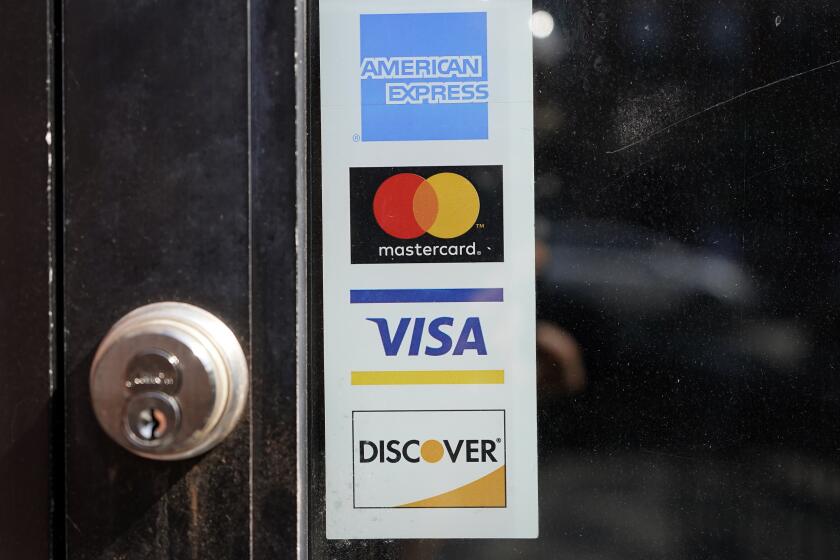0% credit card offers can provide holiday relief — if used wisely

- Share via
It’s hard to say what kills the holiday buzz more: Putting away the festive decorations or a mountain of credit card debt that swells with every interest charge.
But not all credit cards charge interest, at least for a time. If you lack cash on hand to buy all the holiday things, a 0% annual percentage rate card can help you finance those purchases and motivate you to pay them off before the 0% period ends.
These credit cards temporarily waive interest on purchases, some for as long as 21 months, making paying off debt more manageable. Also, some 0% APR cards have a sign-up bonus and earn rewards that can be used to pay down any holiday spending.
According to a 2023 survey from NerdWallet, 20% of Americans say that introductory APR would be among one of the most important factors if they were choosing a new credit card to apply for.
Here are four tips that can help you maximize the value of a 0% APR credit card and avoid a never-ending cycle of debt.
Banks are offering all kinds of incentives to get your money. Here’s what to look for in the fine print.
Make monthly payments on time
A credit card’s 0% APR period refers to the number of months the issuer won’t charge interest, not the months you won’t have to make payments.
Cardholders must make payments toward their credit card balances to keep any introductory APR offer. Miss a payment or make a late payment, and the issuer could revoke the intro APR and begin to charge a high penalty interest rate, which could be almost 30%.
“Late payments could also affect your credit score,” said Melissa Mazard, an accredited financial counselor based in Washington, D.C.
To consistently make on-time payments, set up alerts to remind you when the credit card bill is due or put your bill on autopay.
The 50/30/20 budget was popularized by Sen. Elizabeth Warren and her daughter Amelia Warren Tyagi in their book, “All Your Worth: The Ultimate Lifetime Money Plan.”
Don’t confuse deferred interest with 0% APR
When shopping for a 0% APR card, be mindful of the distinction between a 0% APR offer and deferred interest. Intro APR periods are preferable because cardholders have a guaranteed reprieve from interest charges, so long as they make on-time payments.
As credit card interest rates are notoriously high — the average APR for credit cards that incurred interest was 22.77% as of August , according to the Federal Reserve — a 0% offer can be a true money-saver.
Deferred interest can also save cardholders money — or not. With a deferred interest offer, interest won’t be charged for a specific period of time, such as six months.
If you pay off the entire balance by the end of the term, you won’t owe anything in interest. However, if any part of the original balance remains when the deferred interest period ends — or if you make a single late payment — you’ll owe all of the interest that accrued since the original charge was made.
Ultimately, deferred interest and 0% APR can produce the same desirable outcome, but the safer option, if you can qualify, is a card with 0% intro APR.
Most people who struggle with credit card debt would be better off filing bankruptcy or using a credit counseling service’s debt management program.
Have a debt payoff plan
Whether you end up using a 0% APR card or one with deferred interest, have a plan for spending and for paying off that debt.
“When you don’t have a plan, you might run wild with your spending,” Mazard said. “Move into the season with intention and consciousness, so you’re not left with stress come January.”
Begin by determining a holiday budget. Remember to account for expenses in addition to gifts such as greeting cards, activities, decor, travel and giving. Once you’ve decided on a number, you can set spending alerts on your credit card to notify you when you’ve hit the top of your budget.
Ideally, the amount you budgeted will be equal to, or less than, what you actually spent. Whatever the number is, you’ll need a plan for paying off the credit card. Remember to factor any intro APR or deferred interest periods into your debt payoff schedule.
“Know when the 0% period ends,” Mazard said, referring to any intro APR offer your credit card might have. “Add that date to your calendar and try to get that balance to zero by then.”
For example, if you spend $2,000 on a card with a 15-month 0% APR period, you’ll have to pay $133.33 each month to zero out the balance before the promotional APR ends.
Dear Liz: My friend is not good with money. He has always lived above his means.
Avoid overspending
A 0% intro APR card is a legitimate tool for (temporarily) dodging interest. What it’s not: a license for no-holds-barred spending.
Overspending can quickly negate any savings gained from a 0% APR offer. Spending on a card can feel less real than handing over cash, and it can be tempting to overspend. Mazard recommends taking the credit card out of any physical and digital wallets and removing it as a payment method on shopping websites.
“Don’t only think about today and the holidays,” she said. “Think about when the holidays end and those bills start coming through.”
Bratton writes for personal finance site NerdWallet. This article was distributed by the Associated Press.
More to Read
Inside the business of entertainment
The Wide Shot brings you news, analysis and insights on everything from streaming wars to production — and what it all means for the future.
You may occasionally receive promotional content from the Los Angeles Times.














